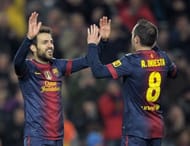On the 23rd of April, Bayern Munich dismantled a disoriented Barcelona side 4-0 at the Allianz Arena in the first leg of the 2012-13 UEFA Champions League semi-final. Tito Vilanova took a risk by playing an unfit Lionel Messi, and Cesc Fàbregas, on the other hand, after scoring four goals in April including a hattrick against Mallorca, was left on the bench as an unused substitute.
A little over a week later, Bayern beat Barcelona 3-0 at the Nou Camp in the return leg, with Fàbregas playing as the false nine, and Vilanova leaving the still-unfit Messi on the bench.
Fàbregas was slated by a number of journalists for his performance, with The Telegraph’s Mark Ogden going as far as saying that Fàbregas has been “paying the price for belong allowed to coast by Arsène Wenger”.
Fàbregas’ habit of falling back on a number of occasions during that game (which might have given Barcelona more options in the middle but left little in terms of options up front) was pointed out by some as an attempt to move into familiar territory, drawing comparisons with his position at Arsenal, where he played behind the striker in a role that allowed him to both assist and score goals. This was evident particularly in the 2009-10 Premier League season, where he had a direct role to play in 38 goals, scoring 19 and assisting 19 more.
To further add to all of this, Barcelona’s 7-0 aggregate humbling at the hands of Bayern sparked off a number of rumours of wholesale changes at the Catalan club – including talk of Barcelona selling a number of players this summer. These players consisted of (and were not limited to) David Villa, Alexis Sánchez … and Cesc Fàbregas. Cesc was asked about his future by Cadena Cope, and was quoted as saying “I do not know what is being said and even what is written, I can only say that I alone know my own future”.
These quotes were promptly lapped up by the British media and instantly portrayed in a perspective that depicted Cesc as being evasive about his future. The logic was almost naive – “He didn’t say he’s staying, so he could be leaving. If he’s leaving, he’s going back to Arsenal!” – but the story sold, and it sold well.
The reality of this potential move away from his boyhood club, however, is plain to see. Cesc Fàbregas isn’t going anywhere. He will not return to Arsenal this summer. It might sound surprising, but Fàbregas still has a lot to provide to this Barcelona team, and he is undoubtedly one of the last players Barcelona are going to want to sell this summer.
The reasoning behind this is simple – Vilanova has shown during the course of the first half of this season (before his 2nd bout with cancer) that he truly values Fàbregas, and isn’t going to let him go. It was clear that Vilanova understood the true value of Fàbregas to Barcelona, and this was evident in his attempts to shift the manner in which Barcelona played. Fàbregas, in turn, showed what he was truly capable of during this part of the season in particular.
Fàbregas was quoted as saying,
“Tito has made it clear that I need to play the way I know. I have to be mobile, look for space and help my team-mates by playing the easy ball”.
This in itself was a change from his role under Guardiola, and Fàbregas understood this –
Under Guardiola, I never really got to grips with the system – playing in central midfield was hard for me because I need more mobility and I am not quick off the mark in the first few meters. It is true that I am a bit anarchic, but that is my style.”
This shift was apparent in the changed roles of Fàbregas and Iniesta during the first half of the 2012-13 La Liga season. Fàbregas played in his preferred role through the middle with Xavi and Busquets behind him, and Iniesta playing further up on the left.
This heightened role of Fàbregas in Vilanova’s Barcelona is aptly depicted by the fact that Fàbregas has the 3rd highest number of appearances for Barcelona this season (28), with only Messi (30) and Valdés (29) having more – only 2 of those appearances were off the bench. Fàbregas, at the start of 2013, had 9 assists, 15 key passes, and 5 goals to his name – Iniesta had 11 assists, 12 key passes and 2 goals to his. Barça shone under Tito before his bout with cancer, winning 18 of 20 league games and 4 of 6 in the Champions League.
Barça’s problems began during the period Vilanova was recuperating, with the team playing under Jordi Roura. They reverted to a style more reminiscent of Guardiola’s Barça – and this led to Iniesta and Fàbregas both becoming considerably less effective, playing in positions defined by Tito but in a system defined by Guardiola. Fàbregas had no assists, and one goal to his name from the beginning of January to the end of March; Iniesta had one goal and two assists in the same time period.
Vilanova returned to manage Barça at the end of March, and while injuries might have played their part in Barcelona’s shock 7-0 aggregate loss, it would be erroneous to judge the significance of Fàbregas to his team by just two games against a remarkable Bayern Munich side who have been determined, organized and outstanding all over the pitch.
But if one thing is clear, it is that if the Barcelona of the 2nd half of 2012 is anything to go by, then Fàbregas is more likely to play a very important role in this Barcelona side as Xavi, now 33, nears the twilight of his career. It is certain, however, that Cesc Fàbregas is not going to leave Barcelona this summer.
All stats acquired from Squawka.com

